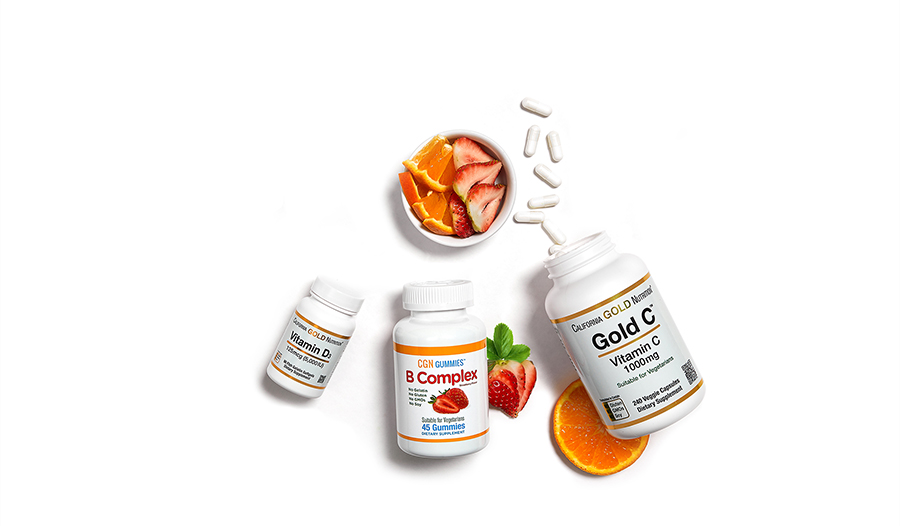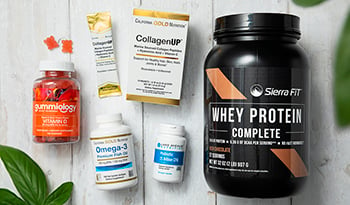What You Need To Know About Supplements—From What They Are to Why They're Popular
DISCLAIMER:This blog does not intend to provide diagnosis...
- In this article:
- What is a Dietary Supplement?
- Are Dietary Supplements Regulated?
- How Do You Read A Supplement Label?
- The Limit of the Health Claims with Dietary Supplements
- How are Dietary Supplements Made and What is GMP?
- iHerb and the iTested Program
- Why Are Dietary Supplements So Popular?
- The Importance of Information in Responsible Self-care

Each year the Council for Responsible Nutrition (CRN) conducts a survey that identifies trends in Dietary Supplement use in the United States. The 2020 results, like those from recent years, indicate that approximately 75% of Americans take Dietary Supplements. But what exactly is a Dietary Supplement? How are they made? How are they regulated? And why are so many people taking them?
At the center of the increased use of Dietary Supplements in the United States over the past three decades is one of the most important legislative bills in the history of the US - The Dietary Supplement Health and Education Act (DSHEA) of 1994. This landmark bill was the result of tremendous support from the American public. In passing DSHEA, Congress recognized that people look to Dietary Supplements to offer health benefits. DSHEA helped to clarify what can be called a Dietary Supplement and how they are regulated.
What is a Dietary Supplement?
DSHEA defined a Dietary Supplement as a product taken by mouth that contains a "dietary ingredient" intended to supplement the diet. The "dietary ingredients" in these products may include vitamins, minerals, herbs or other botanicals, amino acids, and substances such as enzymes, accessory nutrients, and metabolites.
Dietary Supplements can be found in many forms such as tablets, capsules, soft gels, gelcaps, liquids, or powders. They can also be in other forms, such as a nutritional bar or beverage, but if they are, information on their label must not represent the product as a conventional food or a sole item of a meal or diet.
Whatever their form may be, DSHEA places Dietary Supplements in a special category under the general umbrella of "foods," not drugs, and requires that every supplement be labeled a Dietary Supplement.
Are Dietary Supplements Regulated?
Under DSHEA, the United States Food and Drug Administration (FDA) was given guidelines for overseeing the supplement industry and the truthfulness of the claims that are being made. In addition, the Federal Trade Commission (FTC) regulates the advertising of Dietary Supplements.
As with any food product, federal law requires manufacturers of Dietary Supplements to ensure that the products they put on the market are made in cGMP facilities, accurately labeled, and that quality control testing has been performed to help confirm safety.
How Do You Read A Supplement Label?
Thanks to DSHEA, the FDA has requirements for Dietary Supplement labels that can help the public understand what they are purchasing.
Information that is required on the labels of Dietary Supplements include:
- Statement of identity (e.g., "Vitamin D3")
- Net quantity of contents (e.g., "60 capsules")
- Structure-function claims are included on the label to highlight general health and wellness support but are not intended to diagnose, treat, cure, or prevent disease.
- Directions for use (e.g., "Take one capsule daily.")
- Supplement Facts panel (lists serving size, amount, and active ingredient)
- Other ingredients in descending order of predominance and by common name or proprietary blend.
- Name and place of business of manufacturer, packer, or distributor. This information provides the address to write for more product information.
The Limit of the Health Claims with Dietary Supplements
What separates a Dietary Supplement from a Drug is that a Dietary Supplement must not make a claim to treat, cure, or prevent disease.
The difference between a Dietary Supplement and a Drug can be complex. For example, Niacin (Vitamin B3) can be sold in some situations as a Drug for lowering blood cholesterol and triglyceride levels. However, if a Dietary Supplement product had this claim on its label it would be making a drug claim. An important difference is that a drug is prescribed by a Medical Professional who assesses an individual's personalized needs to manage a disease pattern, while a Dietary Supplement can be obtained over the counter to support general health and wellness.
DSHEA allows supplement manufacturers to use claims referring to the supplement's effect on the body's structure or function, including its overall effect on a person's well-being. These are known as "structure-function" claims. Examples of structure-function claims are:
- Vitamin D3 supports normal immune function and host defenses.
- Vitamin C supports the integrity of collagen and connective tissue.
- Glutathione provides antioxidant and detoxification support.
Manufacturers can use structure-function claims without FDA authorization, but like all label claims, structure-function claims must be true and not misleading otherwise the FDA or FTC will step in. Structure-function claims can be easy to spot because, on the label, they must be accompanied with the disclaimer "This statement has not been evaluated by the Food and Drug Administration. This product is not intended to diagnose, treat, cure, or prevent any disease."
How are Dietary Supplements Made and What is GMP?
The FDA has specific rules and regulations for all stages of Dietary Supplement manufacturing that can be recognized by looking for companies that follow Good Manufacturing Practices (“GMPs”).
These GMPs impose extensive process controls on the manufacture, holding, labeling, packaging, and distribution of Dietary Supplements and the components of Dietary Supplements. They require that every Dietary Supplement be made in accordance with a master manufacturing record with all dietary ingredients verified by identity testing before use, that each step in the manufacture, holding, labeling, packaging, and distribution be defined with written standard operating procedures, monitored, and documented.
The FDA may deem any Dietary Supplement "adulterated" if there is a failure to comply with the GMP process. If deemed adulterated, a Dietary Supplement may not be lawfully sold and may be recalled from the market. It is helpful to look for products that note that they have been made using GMP guidelines.
Dietary Supplements must also comply with the Organic Act (for the designation of organic ingredients) enforced by the US Department of Agriculture and the Food Allergen Labeling and Consumer Protection Act of 2004 enforced by the FDA. Under the Organic Act, there are specific requirements for the certification of ingredients as “organic” and requirements on how to use the term "organic" on the label, whether for an ingredient or a complete product.
Per US FDA Regulations, Dietary Supplement products must also disclose on its label if it contains any of the eight identified major food allergens (milk, egg, fish, crustacean shellfish, tree nuts, wheat, peanuts, and soybeans).
The GMPs are designed to ensure documentation of the manufacturing process, including testing results that confirm the identity, purity, quality, strength, and composition of a finished Dietary Supplement. In addition, GMPs require a company to make and keep meticulous written records of every product complaint that is related to GMPs.
Unfortunately, in the Dietary Supplement industry, you can occasionally find companies that market products that do not follow GMP guidelines. Because of the lack of necessary quality control processes, sometimes these products do not meet their label claims and can be considered "adulterated". In fact, sometimes they contain no measurable levels of the compound(s) listed on the product label. With continued efforts to educate the public on how to identify these substandard products and by highlighting quality control testing, hopefully, these bad apples will be forced out of business.
iHerb and the iTested Program
Dietary Supplement manufacturers often use some very good certification organizations that provide quality control guarantees like NSF® (National Science Foundation), USP® (United States Pharmacopeia), UL® (Underwriters Laboratories), and ISURA®. iHerb’s distribution centers are industry-registered by NSF International, earning Good Manufacturing Practice (GMP) registrations.
iHerb’s iTested program goes one step further as each product in the iTested Program:
- Has been tested by a certified 3rd party independent laboratory for ingredients, purity, and label compliance.
- Offers complete transparency by offering a verified report that includes details of the tests that took place and their results
- Allows quality assurance, authenticity, and product guarantee.
Why Are Dietary Supplements So Popular?
In 2020, according to the CRN survey, while overall health and wellness benefits remained the most cited reason to take Dietary Supplements by all users (40 percent), immune health replaced energy as the second most popular reason, with 32 percent citing this factor as to why they take supplements (up from 27 percent in 2019). Following immune support, users report taking supplements to fill nutrient gaps in their diet (25 percent); to support heart health (23 percent); and for hair, skin & nails (22 percent).
The Importance of Information in Responsible Self-care
Today, vast amounts of information on natural products are available from a variety of sources. But, how reliable is this information? And, even with the best information consumers are often confused about how to make the best choices.
iHerb is committed to providing customers with the most transparent and educational information possible on Dietary Supplements. Our blog posts and other resources provide information about the role of Dietary Supplements in promoting health for you and your family. You’ll find answers to help guide you to the proper use of Dietary Supplements, but the use of Dietary Supplements for self-care requires some personal responsibility. With that in mind here are some important points to consider:
- Do not self-diagnose. Proper medical care is critical to good health. If you have symptoms that suggest an illness described in this book, please consult a physician or health care provider immediately.
- If you are currently taking a prescription medication, you absolutely must work with your doctor before discontinuing any drug or altering any drug regimen.
- Make sure your physician and pharmacist are aware of all the Dietary Supplements you are currently taking.
- Many Dietary Supplements provide great health benefits on their own, but they work best when they are used as part of a comprehensive natural approach to health that incorporates diet and lifestyle factors.
Reference:
- CRN 2020 Consumer Survey.

 By Dr. Michael Murray, N.D.
By Dr. Michael Murray, N.D. 


